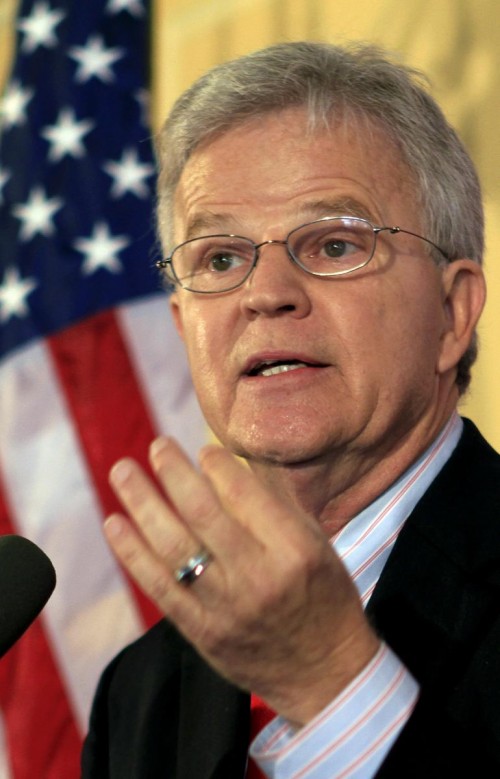Are those spiritual emails you’re reading really real?
February 22, 2012
Chabert chiefs contend comparisons critical
February 22, 2012Some political long shots enter a race with the intention of being the spoiler, intending to deter votes from other contenders. Some are dreamers who hope against hope that they might beat the odds.
Former Louisiana Gov. Charles E. “Buddy” Roemer III insists that he does not fit in either category, but is playing his cards unlike better known Republicans in the 2012 presidential primary.
“I’m taking a different approach,” Roemer said during a telephone interview. “I’ve been involved in politics off and on since I was a teenager and I know it takes money to be competitive, but I also know when the system is corrupt and not working. So I’m going about this differently from anyone else.”
Roemer was the first GOP candidate to qualify for up to $22.8 million in federal funds to run his campaign. Instead of taking the money, the 68-year-old candidate decided that a person with a message that speaks to the public should be able to accomplish needed financial goals without a government handout.
In turn, Roemer launched a bid for the nation’s top elected office by rejecting Political Action Committee funds, he limited contributions to his campaign at $100 per person and decided to make his run with core use of social media and voters talking among themselves rather than being influenced solely by what they see reported on television and in newspapers.
“We are very unique in our approach,” the candidate said. “We are making use of the Internet. We are tweeted and re-tweeted more than all the other candidates put together with more than 25,000 followers. We are running social media. It is the only thing we can afford to do.”
Roemer is not the first presidential candidate to take an unusual approach and be thought of as not standing a chance – many of whom prompted unexpected results.
In 1912, former President Theodore Roosevelt made a bid at returning to office following a split in the Republican Party that placed him against incumbent, and his handpicked successor to the White House, William Howard Taft.
Running as a third party candidate, Roosevelt was able to see Taft fail in earning a second term by splitting a vote of loyalties. In that effort, however, TR – the first president to become known by his initials – paved the way for Democrat Woodrow Wilson to become the 28th president of the United States.
From the aftermath of the Vietnam War, Watergate Scandal and 1974 resignation of President Richard Nixon, voters in 1976 were ready for drastic changes in the politics that had soured them on government as a whole.
From the realm of unknowns, a two-term state senator, one-term governor and peanut farmer from Georgia emerged as a dark horse candidate, ultimately clinched the Democratic Party nomination and 1976 Jimmy Carter, against all odds, won official access to the White House.
Historians note that Bill Clinton was elected president in 1992 with 43 percent of the popular vote, in large part because Texas billionaire H. Ross Perot, running as a long shot third party candidate split Republican loyalties and took 18.9 percent of the popular vote needed by incumbent George H.W. Bush, to become the most successful third party candidate since Theodore Roosevelt 80 years earlier
Political analyst Elliott Stonecipher said that with no outstandingly favored presidential candidate among Republicans, Roemer could either emerge from the far reaches of the Deep South to win as Carter did 36 years ago, or, if he does not fare well in the Republican primaries, become a popular third party candidate, like Perot, and run knowing there is a good chance that incumbent Barack Obama could secure a second term in a three way split.
“[Long shot candidates] generally fail,” Stonecipher said. “In the primary process the greatest out of nowhere campaign was Jimmy Carter. [He] took advantage of the process [and implemented] a crazy strategy that worked. It has not been duplicated. Perot didn’t have a strategy to win. Carter had a strategy to win.”
“I think the next president should be free to lead,” Roemer said. “I’ve tried to make that the hallmark of my campaign.”
In the past, Roemer has had an arm’s length relationship with party leadership among both Democrats and Republicans. “John McCain said he was a Maverick, but Buddy Roemer is the real Maverick from party influence. … I’m sure he is aware of his intentions,” Stonecipher said.
Nationally recognized political analyst from Shreveport explained that in the current presidential race, the availability of money creates a third party possibility.
Stonecipher said that office seekers like Roemer and other candidates less likely to be claimed by Republicans or Democrats are being looked at by American’s Elect, a non-partisan third party organization that bills itself as conducting the first ever online presidential primary. A spokesman with American’s Elect could not be reached by telephone, but according to the group’s website, 80 percent of American voters surveyed said they would consider a third party candidate in 2012. The organization has not endorsed any specific presidential candidate at this time.
Stonecipher said it is a legitimate possibility that Roemer is making use of the Republican primary to gain name recognition so he could later emerge as a strong independent candidate.
To date, Roemer has raised approximately $400,000 nationwide with contributions from all 50 states and average contributions of $40. This candidate claims having 10,000 contributors and qualifies for matching funds by way of income tax return contributions, and the only candidate that has not been on a national debate but still is at 4 percent on national polls.
“We are running a national campaign,” Roemer said. “We pay all of our bills and owe no money. We are tight. We are a small business approach. The [Republican] Party does not tell us what to say or do, nor does anyone else.”
“Think about it,” the analyst said. “There are at least two, ‘Mess everything up,’ scenarios out there in the eyes of the Republican establishment. All along the idea of Buddy being a third party candidate has been out there.”
“I don’t think Washington D.C. is broke,” Roemer said as part of what has become a mantra for him. “I think it is bought. The big boys who have the power exercise the money and the politicians take it because they need the money to get re-elected. That’s the game.”
Roemer is critical of both Democrat and Republican presidential candidates for taking a position of compromise rather than going against the grain. “I’ve heard people [over the years] say, ‘Well, we don’t have a choice.’ I think we do have choices from the national debt, to the tax code, to favoritism, to unemployment and unfair trade, and I came to the conclusion that we need reforms.”
Roemer served four terms in Congress from 1981 to 1988 as a conservative Democrat. He switched to the Republicans to run against Edwin Edwards in 1987 and became governor of Louisiana.
Emerging from a private career that has included the founding of a business-financing bank, Roemer confirmed that he intends to remain in the fight for a Republican nomination on the presidential ballot. He declined to either confirm or deny if there were chances he might return in the general election as an independent candidate.
“If I could get 1 million people to believe as I do that the country is a great country, but it is in trouble and need a president free [from party obligations] to lead, that is $100 million and that is more than any Republican will spend in the nomination process,” Roemer said.
The former Louisiana governor said that he has not been invited to participate in presidential primary debates in part because of his being considered a longshot. “I’m the only guy running that has been a congressman and a governor,” he said. “I’m the only guy running who fought corruption in his own state. I’m the only guy running that has built a $1 billion bank with no bailouts. I’m the only guy running that has a bank that didn’t foreclose on a single mortgage. The question is not how I am not known. The question is why have I not been invited to be on the debate? The Republicans and Democrats are connected at the billfold, and it is not in America’s best interest. We are going to run that message as far as we can.”
Roemer admitted to being a longshot within the status quo because he challenges established politicians. “I have come to that decision because I don’t believe anything will happen in budget reform or tax reform or jobs reform until we take special interest money out of Washington. It ain’t broken. It’s bought.”
The only question for Roemer, as well as any candidate tagged as a long shot, is will the voting public buy into their positions of being different from major party candidates and put the odds in their favor as viable alternatives looking for an opportunity?
Former Louisiana Gov. Buddy Roemer says he is serious about his
bid for president although in mainstream political circles he might
be considered a long shot. Research shows that 80 percent of voters
say they would consider a third-party candidate.











